Blasts At IRGC Base In Tehran Last Week Was Sabotage – Lawmaker
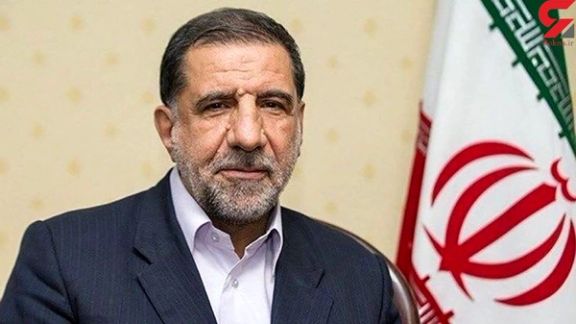
An Iranian lawmaker confirmed on Tuesday that the explosions at one of the Revolutionary Guard’s bases in southeast Tehran on July 1 was sabotage.

An Iranian lawmaker confirmed on Tuesday that the explosions at one of the Revolutionary Guard’s bases in southeast Tehran on July 1 was sabotage.
Tehran’s representative at the parliament Mohammad Esmail Kosari -- who is a former commander of the IRGC’s Sarallah (Sar-Allah) Headquarters tasked with the capital’s security – tried to make the incident look unimportant in his remarks, saying the blasts were the result of “two very weak improvised explosive devices.”
Kosari did not mention possible injuries and casualties in the explosions, and Iranian official media and websites affiliated with the Revolutionary Guard have remained silent on the incident.
In a statement, the exiled Iranian opposition group Mujahedin-e Khalq Organization (MEK) claimed the attack was carried out by “revolutionary cells”, a term it often uses to characterize anti-regime acts and protests in Iran.
"They [the MEK] use their local agents with promises. Anyway, it was Friday, which is a day off, they came at 9:00 p.m., made use of the darkness, carried out the act and took a video."
Videos surfaced on social media on Friday night showing fire and smoke billowing from the Malek Ashtar base of Iran’s Revolutionary Guard’s paramilitary force Basij militia.
Since May, there have been several attacks and mysterious incidents against Revolutionary Guard (IRGC) officers. One key commander was assassinated in Tehran on May 22 in broad daylight, while another was said to have fallen from the roof of his house and died a few days later. Iran has blamed Israel, in what has damaged the reputation of Iran’s intelligence and security organizations.
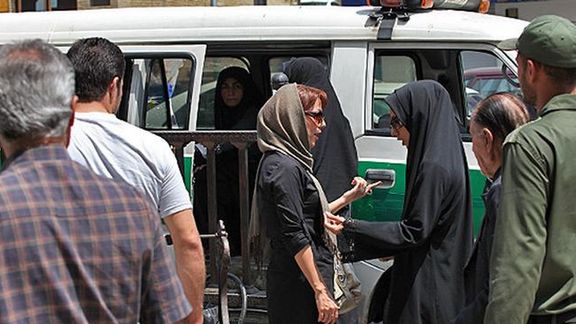
Iran’s hardliner President has ordered all government entities to strictly implement a “chastity and hijab” law after weeks of harsher measures on the streets.
In a meeting with officials on Wednesday Raisi called lack of compliance with hijab rules “an organized promotion of [moral] corruption in Islamic society.” Going a step further he said that this has been organized “by world arrogance”, a reference to the United States.
Harsher than usual enforcement of the Islamic dress code (hijab) this summer has raised protests from many in Iran including some moderate religious and political figures.
Raisi went on to put a further ideological spin on the issue: “The enemies of Iran and Islam using extensive satellite TV and social media networks have targeted society’s cultural backbone and foundations of its religious values.”
There is little evidence of any foreign conspiracy, except some Iranian activists in the West campaigning against compulsory hijab. One such activist in the United States was even reportedly targeted for kidnapping by Islamic Republic agents.
Street patrols by ‘hijab police’ or ‘chastity police’ have intensified in recent weeks with women with loose headscarves being subjected not only to verbal harassment but also physical force.
Some Iranian officials have recently issued strict orders for enforcing what they call proper hijab among female government employees and others by restricting service to those who do not abide by the prescribed rules.
The hijab required in the Islamic Republic consists of a long and loose dress in muted colors worn over trousers with a similarly plain headscarf that covers all hair and shoulders. Authorities including Supreme Leader Ali Khamenei say wearing a long black veil (chador in Persian) that covers from head to toe is the ‘optimal hijab’.
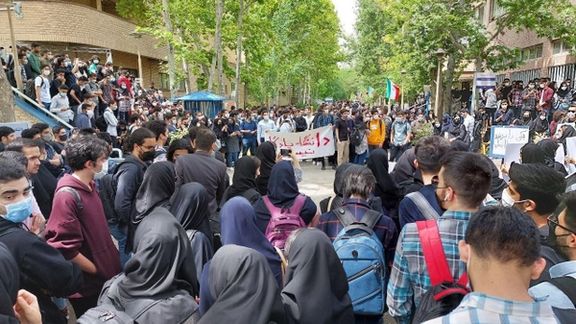
The headscarf version is acceptable in most places while the chador is a requirement in many government offices, higher education facilities, and meetings with high-ranking officials including Khamenei.
While most Iranian women wear the headscarf version of hijab, willingly or unwillingly, only a small minority willingly wear the chador.
In the jargon of religious and political hardliners women who are unwilling to wear the hijab and display their displeasure by wearing small and colorful headscarves with tight-fitting, short dresses are called ‘bad-hijab’ ones. Authorities sometimes take harsh measures against ‘bad-hijab’ women. Punishments include arrest, prison, cash fines, and even lashing but have not always been meted out to the same degree.
Esmail Rahmani, deputy public prosecutor of the religious city of Mashhad has recently ordered the municipality to prevent ‘bad-hijab’ women from using public transportation including the metro and threatened to take legal action against such officials for failing to do so. He has also ordered the governor to ban services in banks and government offices to ‘bad-hijab’ women.
The governor of Fars Province, Mohammad-Hadi Imanieh, has also issued an ultimatum to heads of government organizations to enforce the acceptable forms of hijab. Imanieh has said that government employees who are not willing to abide by the rules should take leave without pay and only return to work “when they can respect the law”.
Mohsen Borhani, a professor of law at Tehran University with a religious seminary education background, in a tweet Monday protested against enforcing the hijab through restricting service to ‘bad-hijab’ women. According to Iran’s own Islamic Penal Code, he argued restricting personal freedoms of citizens by any official of the government or state is punishable by law, he argued.
Sometimes authorities shift the burden of enforcement of hijab to businesses, such as food joints and cafes and shopping malls, to deny service to ‘bad-hijab’ women and shut down their businesses if they do not comply. This year pressure has increased on businesses.
Most Iranians, whether they are religious or not, do not agree with compulsory hijab while many view its enforcement by the state as a violation of human rights.
Mohammad-Ali Abtahi, a cleric who served as vice president under reformist Mohammad Khatami, called the crackdown for hijab “an insult to Iranian women and an insult to all of Iran” in a commentary carried by conservative Khabar Online news website Monday.
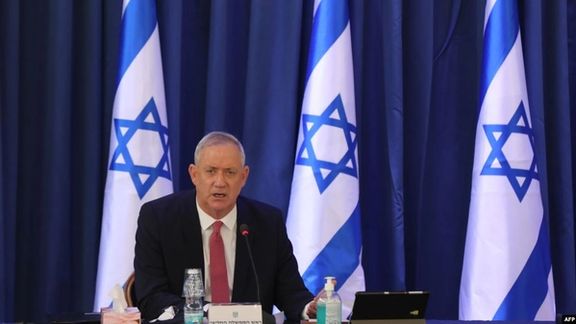
Israel’s defense minister said Tuesday that Iran is expanding its aggressive operations in the region in general, and in the naval arena in particular.
At the Annual Economist Government Roundtable in Greece on Tuesday, Benny Gantz unveiled recent satellite images showing four Iranian military ships in the Red Sea, adding that the Islamic Republic has been “unusually” patrolling the region with its military ships.
The four military ships in the Red Sea were a Hengam-class landing ship, two Bandar Abbas-class replenishment ships – which are auxiliary fleet supply vessels – and a Mowj-class light frigate.
“Today, we can confirm that Iran is methodically basing itself in the Red Sea, with warships patrolling the southern region,” he noted.
Describing the Iranian presence as a direct threat to trade, energy and the global economy, Gantz said, “The presence of Iran's military forces in the Red Sea in recent months is the most significant in a decade.”
Referring to the recent test launch of a satellite carrier rocket, whose “technology could be used to develop a long-range intercontinental missile with a range of thousands of kilometers that could also threaten Central Europe,” he said, “Iran is a prime example of a widespread regional and global threat.”
The United States Naval Institute said last week that satellite imagery shows Iran is constructing a new stealth missile boat on the island of Qeshm in the Strait of Hormuz in the Persian Gulf. The unidentified catamaran is similar to another new multi-hulled missile watercraft -- a Shahid Soleimani-class missile corvette -- but is noticeably smaller.

Belgian lawmakers Tuesday debated a prisoner exchange treaty with Tehran that critics oppose, saying it will release an Iranian diplomat convicted of terrorism.
Justice Minister Vincent Van Quickenborne urged the foreign relations committee of Belgium's lower house to back an accord that intelligence services believed could avert an increased threat against Belgian interests.
"People's lives are at stake," the minister said, adding one threat that had materialised was the detention of a Belgian man in Iran since February.
Many lawmakers spoke about the possibility of an exchange to secure the release of the man, first identified by Iran International as a 41-year-old aid worker, and Swedish-Iranian academic Ahmadreza Djalali, who had taught in Belgium and has been sentenced to death in Iran.
Iran has called for the release of Assadollah Assadi, sentenced to 20 years in prison in Belgium in 2021 over a foiled 2018 bomb plot. His was the first trial of an Iranian official for suspected terrorism in Europe since Iran's 1979 revolution.
Many Iranian groups and activists as well as former senior US officials have urged the Belgian parliament not to approve the treaty, citing increased risk of fresh Iranian terrorism.
Several lawmakers expressed concerns that it could encourage Iran or others to seize Belgians.
"Would this open the door to a sort of hostage diplomacy?" said Greens member Wouter De Vriendt.
The committee was due to vote on the bill on Tuesday but adjourned the session until Wednesday after nearly four hours of debate. It is likely to be put before the full 150-member chamber on Thursday.
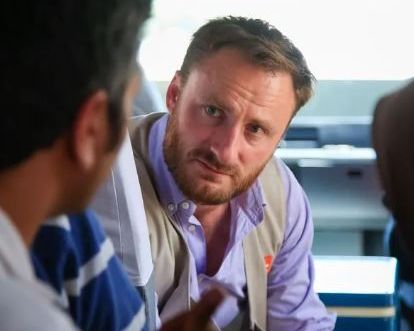
Brussels has confirmed that Iran has been holding a Belgian man for the past four months under “espionage” charges as it weighed a controversial prisoner swap treaty with Tehran.
Belgium’s Justice Minister Vincent Van Quickenborne said Tuesday the man was seized in Iran on February 24 and has been in “illegal” detention since.
He did not identify the man but he was most likely referring to Olivier Vandecasteele, a 41-year-old Belgian aid worker who has served in various international humanitarian organizations since at least 2006.
The announcement by the ministry came after Iran International revealed the identity of the Belgian national, who had previously worked in India, Afghanistan, and Mali and later became the director of Norwegian Refugee Council’s Iran operations in 2015 and assumed the same position with Relief International in Iran in 2020. On July 2, an informed source had told Iran International that at least two Belgian citizens are currently in prison in Iran.
A draft law proposed by the Belgian government to the parliament could put the seal of approval on an agreement with Iran, which could lead to the release of Assadollah Assadi, an Iranian diplomat serving a 20-year prison sentence in Belgium for planning a terror attack in Paris four years ago.
Numerous people and groups from around the world have warned about the imminent perilous consequences of the prisoner exchange treaty, calling “the green light to state terrorism” that only emboldens the Islamic Republic.

Iran is likely to be a central issue in United States President Joe Biden’s mid-July Middle East tour – with differing expectations as to what he may achieve.
Biden’s trip, July 13-16, has reportedly put on hold until later this month further talks to revive the 2015 Iran nuclear deal, the JCPOA (Joint Comprehensive Plan of Action), pushing them beyond a related four-week deadline announced early June by Rafael Mariano Grossi, head of the International Atomic Energy Agency (IAEA), for the agency’s ability to certify the peaceful natureof Tehran’s atomic program.
By the last quarter of 2022, Biden’s leeway could be restricted by Democratic Party losses in mid-term Congressional elections. The continuing expansion of Iran’s nuclear program beyond JCPOA limits, including the enrichment of uranium to 60 percent purity, has led many of the deal’s US critics, Democrats but especially Republicans, to call failure on Biden’s approach.
Some speculation over Biden’s Middle East trip – which will take in Israel, the occupied Palestinian West Bank, and Saudi Arabia – centers on whether he will meet Saudi Crown Prince Mohammad bin Salman, whom Biden criticized on coming to office after US intelligence implicated him in the 2018 murder of dissident journalist Jamal Khashoggi in the Saudis’ Istanbul consulate.
‘Not about Saudi Arabia’
Biden told reporters at the Nato Madrid summit last week that his visit to Riyadh was to a summit of Gulf nations. "It’s in Saudi Arabia, but it’s not about Saudi Arabia,” Biden said. “And so there’s no commitment that is being made or – I’m not even sure; I guess I will see the king and the crown prince, but that's – that’s not the meeting I'm going to. They’ll be part of a much larger meeting.”
The president will meet leaders of the six-member Gulf Cooperation Council – Saudi Arabia, the United Arab Emirates, Oman, Kuwait, Qatar and Bahrain – as well as the leaders of Egypt, Iraq and Jordan.
US officials have suggested the president’s visit will take forward plans for closer military co-operation between Israeli and the Arab Gulf States, aimed at thwarting Iranian and Iranian-supplied missiles and drones, and building on the US-brokered 2020 Israeli ‘normalization’ agreements with the UAE and Bahrain.
Pumping more oil?
Biden said in Madrid that the Israelis had “come out so strongly for my going to Saudi.” But it remains unclear whether a new defense arrangement would make JCPOA revival harder or help make its revival more palatable to Saudi Arabia and Israel.
While pragmatists have argued Biden should seek Saudi agreement to pump more oil and curb cost-push inflation that has sent gasoline prices in the US to around $5 a gallon, human-rights advocates say he should concentrate on holding the Saudis and others accountable over human rights. Supporters of the JCPOA, meanwhile, argue the deal’s revival would ease oil prices by easing US sanctions restricting the flow of Iranian crude.
King Salman, now 86, is widely reported to oppose ‘normalization’ with Israel ahead of the acceptance of a viable Palestinian state, in line with Arab League policy since 2002. In 2008, according to cables unearthed by Wikileaks, King Salman urged the US to “cut off the head of the snake” with military strikes on Iranian nuclear sites.